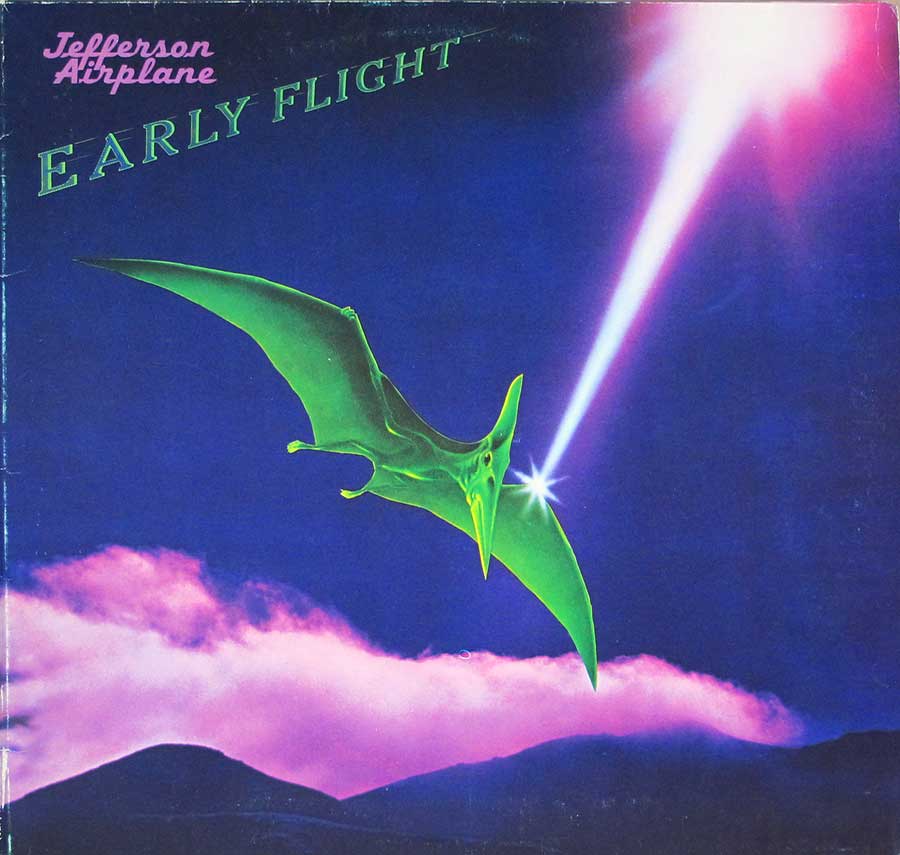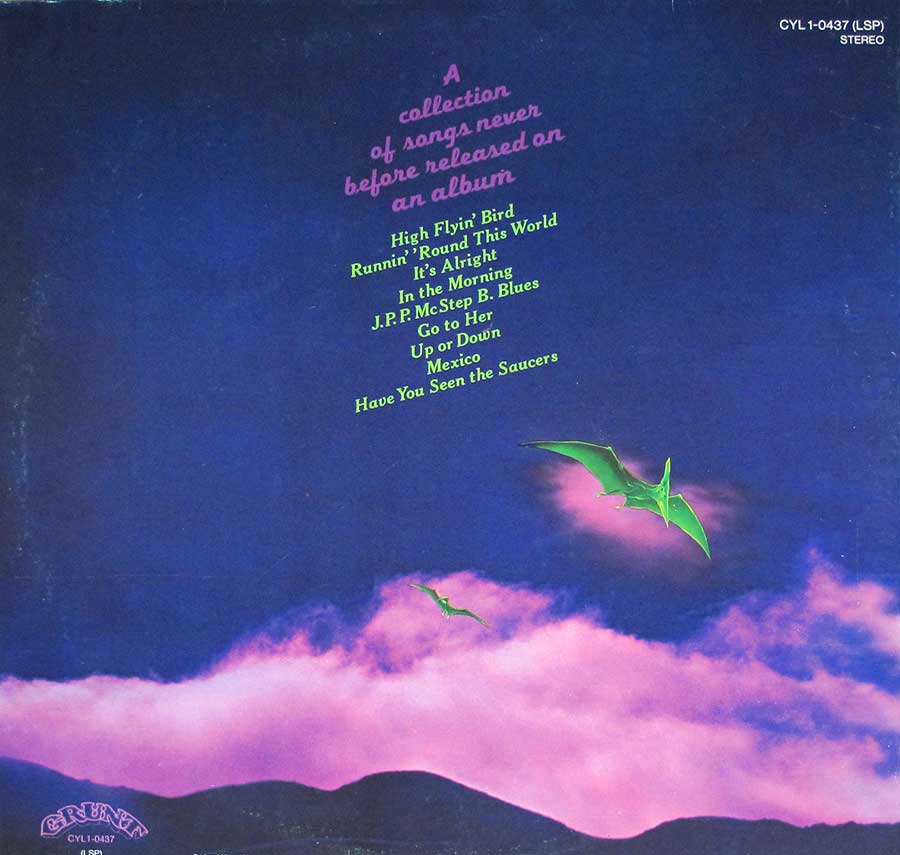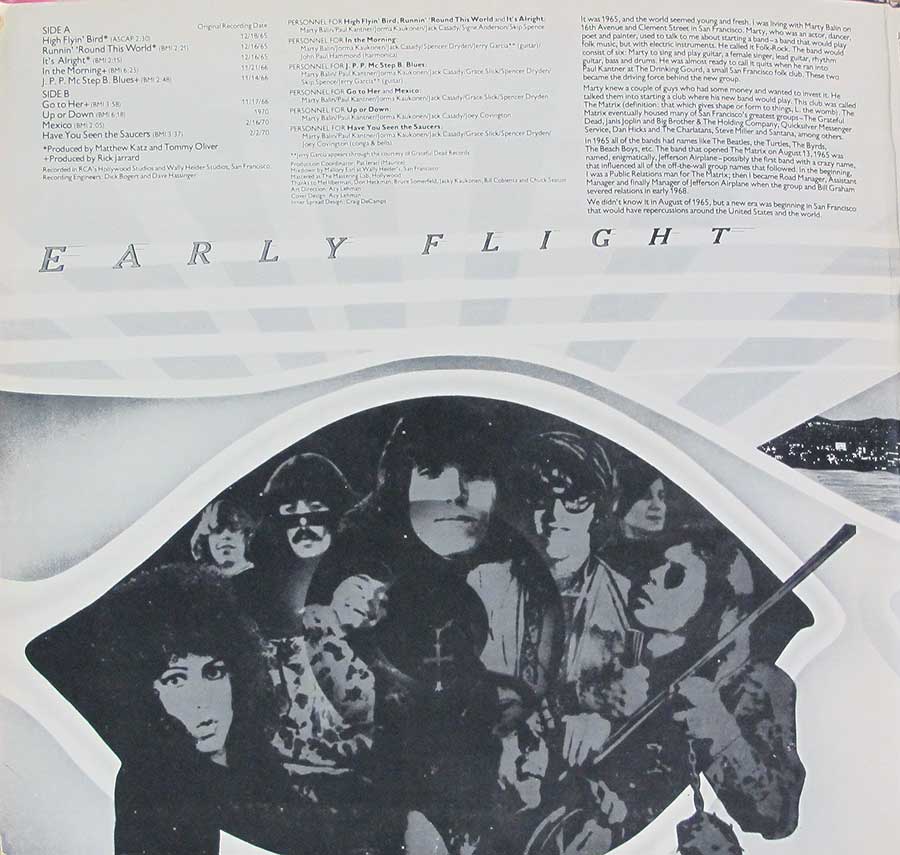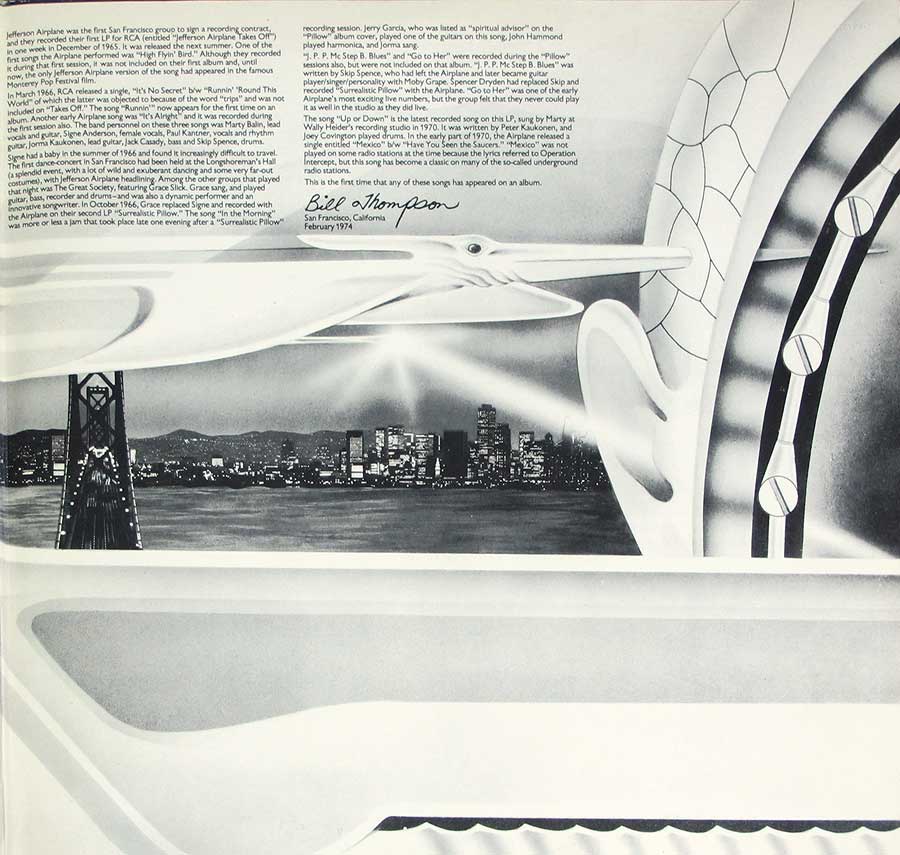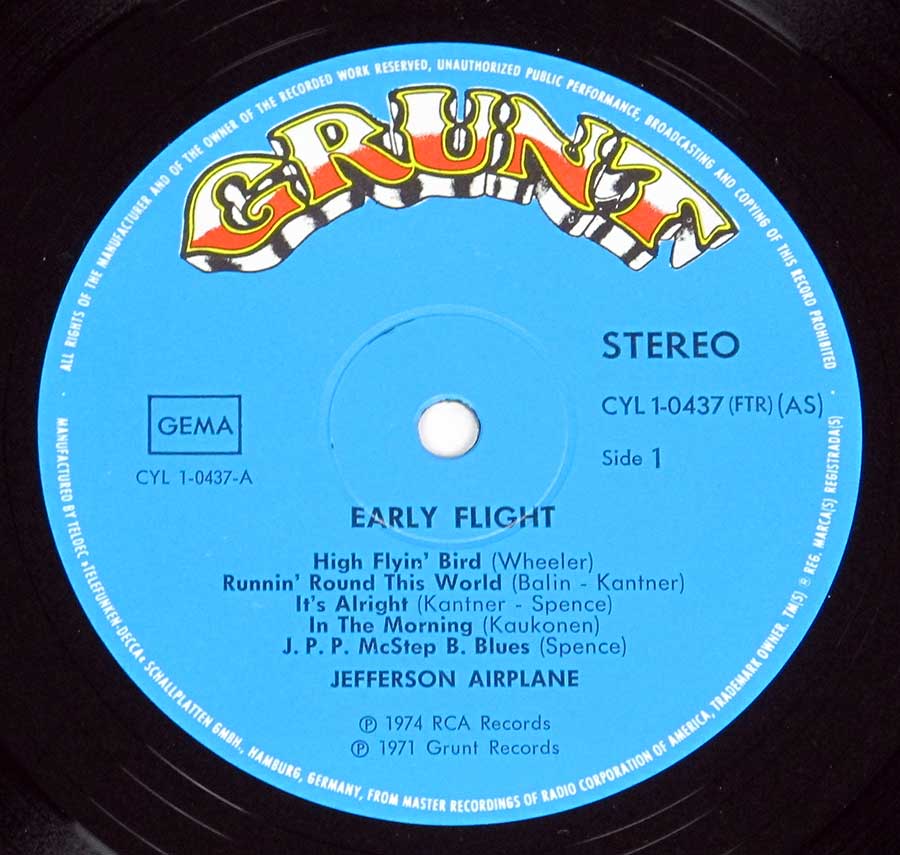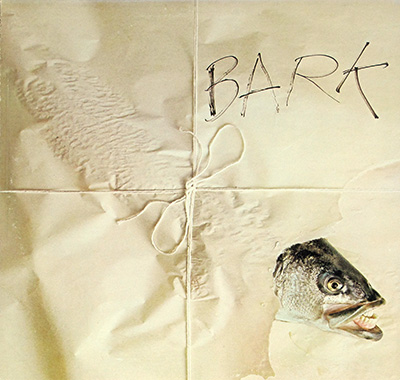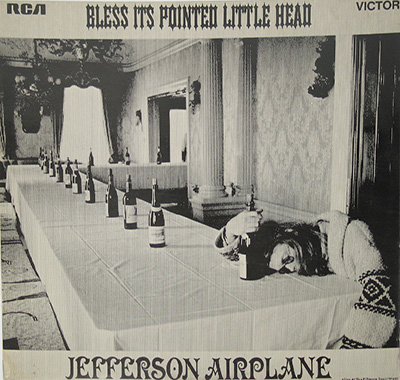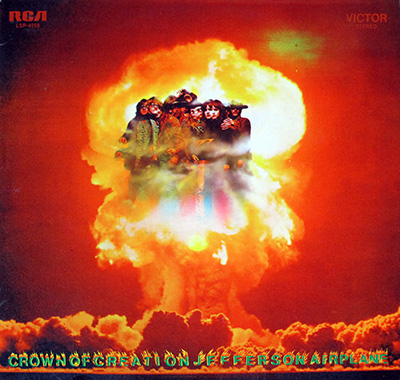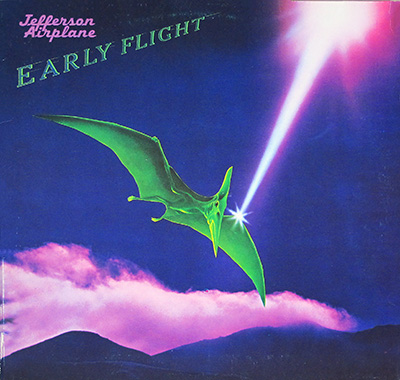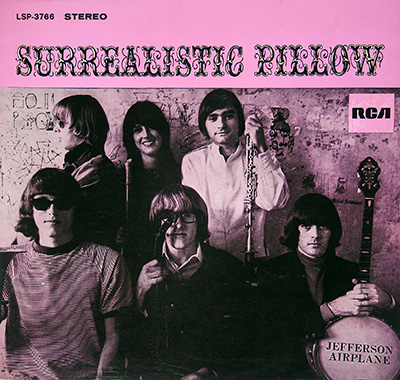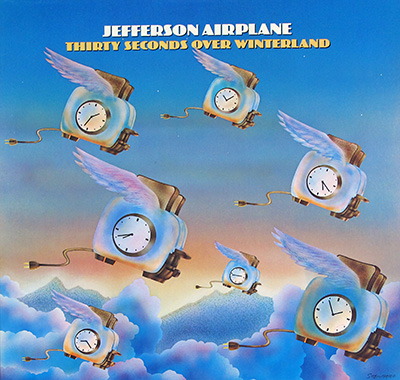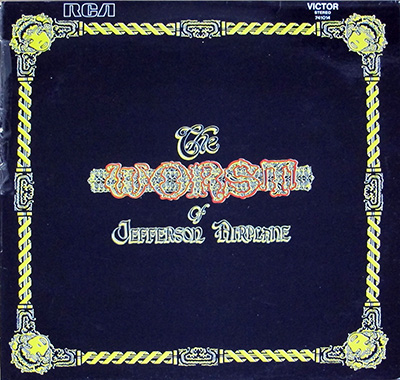Grace Slick, the rare front woman who could sound both regal and dangerous in the same breath, walked into the Bay Area storm with The Great Society (1965–1966), then leveled the room with Jefferson Airplane (1966–1973) and came back for the reunion (1989). After the Airplane splintered, I watched her steer the heavier, road-tough years of Jefferson Starship (1974–1978, 1981–1985-ish), then ride the glossy hit-factory era as Starship (1985–1988) while still singing like she owned the sky. “White Rabbit” and “Somebody to Love” weren’t just songs to me—they were psychedelic hard proof that a voice can reroute culture. Grace Slick Wiki
Early Flight: Jefferson Airplane's Psychedelic Strays and Studio Mind-Melts Album Description:
Some albums fall together like puzzle pieces; others drift through the cosmos for years before crash-landing on wax. "Early Flight", released in 1974, is Jefferson AirplaneÕs kaleidoscopic yard saleÑan out-of-time compilation that digs through the band's sonic attic and finds fuzz-coated relics, alt takes, and spaced-out jams that never made it to the family table.
The Psychedelic Fog of War (1965-1970)
The tracks on "Early Flight" float in from a volatile American decadeÑVietnam, civil rights uprisings, hippie idealism souring into Altamont acid. Jefferson Airplane, flagbearers of the San Francisco sound, had been turning social chaos into sonic sculpture. This album scoops up the offcuts from that eraÑpre-fame demos, rejected singles, and the orphaned children of various studio sessions that had nowhere else to go.
You hear Signe AndersonÑGrace SlickÕs predecessorÑholding court on "High Flying Bird", recorded in 1965 at RCA Studios in Hollywood. ItÕs a folk-rock fossil, a beatnik protest song soaked in nervous energy, straining to break free of its own acoustic roots. By contrast, ÒUp or DownÓ from the 1970 sessions captures a band splintering, balancing paranoia and perfectionism with Jack CasadyÕs rubbery bass and Jorma KaukonenÕs sleepy-eyed blues-guitar venom.
Genre-Hopping in a Smoked-Out Zeppelin
Call it folk-rock, call it acid rock, call it proto-something-or-otherÑbut genre labels melt like vinyl under a lava lamp when "Early Flight" is spinning. These tracks wander between garage rawness and interstellar improvisation, with Marty Balin and Paul Kantner fighting for control of the steering wheel while the rest of the band smokes something in the back seat. "Mexico" and "Have You Seen the Saucers?" ride a wave of sci-fi paranoia that sounds like Philip K. Dick scoring a surf film. If itÕs rock, itÕs rock filtered through a psychedelic chem lab and a Berkeley poetry slam.
Stoned in the Studio: Production and Recording
This ainÕt a slick album, and itÕs not supposed to be. These are sessions taped on RCA's dime at a time when the band still had something to proveÑor something to destroy. Producers like Rick Jarrard and the band members themselves kept the controls loose, often letting takes sprawl into drugged-out meditations. "Please Come Back" was cut in 1966 but shelved for being too strange (or maybe too good?) for their debut. Even the later tracks, like "Up or Down", produced with a tighter grip, retain that sense of barely-contained madness.
Some of these sessions bled out of Studio C at RCAÕs Hollywood bunkerÑothers were caught live on tape in San Francisco, where the walls probably sweat LSD. You can almost smell the patchouli and reel-to-reel grease.
Flying in Formation or Falling Apart?
The tension between past and present bleeds through these tracks like mescaline sweat. The compilation collects songs recorded between Õ65 and Õ70Ñyears when the band changed vocalists, freaked out their label, and slowly detonated from within. "Mexico", written during the Nixon administrationÕs paranoid war on pot, got the Airplane into hot water with RCA, who delayed its release and nearly pulled the plug. But here it soars with a rebel snarl, a middle finger dressed in paisley velvet.
Outtakes or Time Capsules?
What sets this album apart from standard-issue retrospectives is its refusal to tidy things up. Some versions of "Early Flight" include different mixes or track sequencesÑdepending on the country, the pressing, or how stoned the A&R guy was when compiling the tape reel. But fundamentally, the record is a bootleg in RCA drag: raw, imperfect, and glowing with secondhand transcendence.
"Early Flight" isnÕt a journeyÑitÕs a detour. A detour into what the band couldÕve been, shouldÕve been, or mercifully wasnÕt. ThereÕs no grand arc, no conclusion, just fragments of truth echoing through blown speakers.
Final Descent
Jefferson Airplane never made a linear album, and this one makes even less sense. ItÕs a cloud of smoke, a backwards glance into the psychic wreckage of a band that flew too close to the sun and crashed into a reel of magnetic tape. And thank the gods of fuzz and delay for thatÑbecause these ghosts sound a hell of a lot more alive than half the stuff that made it to the original LPs.
Put it on, turn off the lights, and let the static speak.
